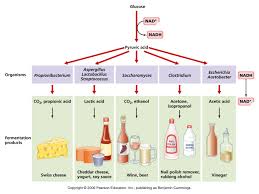记忆方法
将“fermentation”分解为“ferment”(发酵)和“ation”(表示过程或行为),记忆方法可以是将“发酵”过程想象为一段“action”或“activity”(动作或活动),这样就能记住这个单词代表的是发酵这一过程或行为。
以上内容由AI生成, 仅供参考和借鉴
英语词源
- fermentation (n.)
- late 14c., in alchemy, with a broad sense; modern scientific sense is from c. 1600; from Late Latin fermentationem (nominative fermentatio), noun of action from past participle stem of Latin fermentare "to ferment" (see ferment (v.)). Figurative use attested from 1650s.
权威例句
- 1. It acts as a catalyst in the process of fermentation.
- 它在发酵过程中起触媒的作用.
- 2. The process, in which the tea develops its characteristic astringency, is known as fermentation.
- 茶开始散发涩味的过程称作发酵。
- 3. Sugar is added to the wine during fermentation to increase the alcohol level.
- 发酵时在葡萄酒里加糖以提高酒精浓度.
- 4. Alcohol may be made by fermentation of many plants.
- 许多植物经过发酵可以提炼出酒精.
- 5. Fermentation also makes bread dough rise and helps us digest food.
- 利用发酵也可以使做面包的面团发起来,还能帮助我们消化食物.
